
It is one of human beings’ most recurrent nightmares.
You get frail, or old, or sick. You lose your autonomy. Some other person starts making decisions on your behalf. You are not you anymore, but what another person commands you to be. You feel you become less than a human, but there’s nothing you can do about it.
If we surveyed older people around us, we would hear, more often than not, that they dread the day when they are not able to make their own calls. As human beings, losing control over our destiny is the source of uneasy trepidations. It is the reason why, for instance, more people get nervous when flying rather than being behind the wheel. No matter what statistics say, cars feel safe but planes not. We feel contingencies can be managed in a car, but stuck on a plane seat, we feel totally powerless.
An Ethical Knob?
Recently, as driverless cars become less of a dream and more of a possibility, the discussion on the topic turned from the technology needed—which car companies say is a done deal—to ethical questions driverless cars would pose.
Part of the ruckus was triggered when media sources informed that driverless cars could let you ultimately choose who survives in an eventual crash. In short, while in a dangerous situation, the driver currently acts on instinct, in driverless cars, that control would be transferred to a computer with predetermined settings. To avoid losing control, an “ethical knob” could be included to help you “set the car to sacrifice you for the survival of others, or even to always sacrifice others to save you,” wrote Abigail Beall in The New Scientist.* You could ideally switch a car’s setting from “full altruist” (putting the lives of others first) to “full egotist” (your life before any other), with the middle setting being supposedly impartial.
As Beall and others explained, however, it is not a foolproof plan. Scientists and ethical theorists are wondering what would happen, for instance, if everyone chose the maximal self-protective mode. Would the system cancel itself? On the other hand, “if everybody were to choose the impartial option, the ethical knob will not help with the existing dilemma,” wrote Beall. Who will ultimately bear moral responsibility for the life or death of another person?
In Search of Autonomy
In a more consequential sense, however, the Bible reveals that human autonomy was lost almost from its beginning. In fact, from the moment Adam and Eve left the Garden of Eden, human history has been nothing but the story of what happens after free morally-created agents waived their right to free choice and put themselves into the hands of an enemy set on destroying them. Looking for autonomy, they lost it. Somebody else began to make the calls. And the prospects of survival were null.
But then, “the people who walked in darkness [saw] a great light; those who dwelt in the land of the shadow of death, upon them a light [shone]” (Isa. 9:2). Because “when the fullness of the time had come, God sent forth His Son…to redeem those who were under the law, that we might receive the adoption as sons” (Gal. 4:4, 5).
To save us from our default “full egotistical” settings bound for destruction, God sent His son in “full altruistic” mode, to give us back the autonomy He intended for us from the very beginning. His settings are never impartial, because His coding has our best interests in mind, even at the cost of His life.
According to a prayer recited over the Jewish High Holidays, “on [New Year] is inscribed and on [the Day of Atonement] is sealed…who shall live and who shall die.” While this refers mostly to physical existence, autonomy seems to take the backseat here!
The Bible’s take is fundamentally different. It tells us that He came down. He was born. He lived a perfect life. He died. He resurrected. He’s interceding. He’s coming soon.
The Baby born in Bethlehem launched a process to give you and me our autonomy back. Now we are free. Free to choose. Truly autonomous. In fact, each one of us is so autonomous that not even He can choose for us. Our life or death is in our hands now. “Therefore, [let us] choose life” (Deut. 30:19).
* Abigail Beall, “Driverless cars could let you choose who survives in a crash,” New Scientist, Oct. 13, 2017.